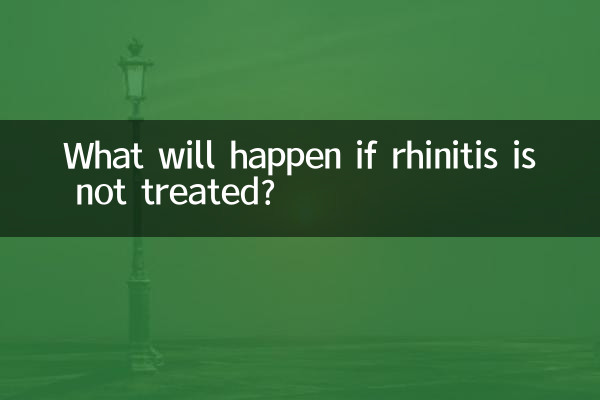Title: What will happen if rhinitis is not treated? 10-day network hotspot analysis and health warnings
Recently, discussions on health topics across the Internet have continued to rise, with issues related to rhinitis becoming one of the focuses. This article combines the hot data of the past 10 days to conduct a structured analysis of the possible consequences of untreated rhinitis and provide scientific suggestions.
1. Popularity statistics of rhinitis-related topics across the entire network (last 10 days)

| platform | Amount of related topics | Highest number of reads | core concerns |
|---|---|---|---|
| 128,000 | 320 million | rhinitis complications | |
| Tik Tok | 95,000 | 180 million | Treatment remedies |
| Zhihu | 63,000 | 48 million | long term harm |
| Station B | 21,000 | 32 million | Surgery cases |
2. Six potential hazards of untreated rhinitis
1.worsening of chronic inflammation: Long-term nasal inflammation may spread to the throat and ears, causing complications such as otitis media and pharyngitis.
2.sleep disordered breathing: Data show that about 38% of patients with sleep apnea syndrome are accompanied by rhinitis symptoms without standardized treatment.
3.Reduced sense of smell: Continuous swelling of the nasal mucosa can lead to atrophy of the olfactory nerve, and in severe cases, the sense of smell may be permanently lost.
4.Facial development effects: Pediatric patients may have adenoid facial features, such as short and thick upper lip, unevenly arranged teeth, etc.
5.Cardiopulmonary function burden: Long-term mouth breathing will lead to a decrease in blood oxygen saturation and increase the workload of the cardiopulmonary system.
6.Decreased quality of life: Indirect effects such as headache, lack of concentration, and reduced work efficiency.
3. Comparison of recent hot treatment methods
| Treatment | Discussion popularity | efficient | Applicable people |
|---|---|---|---|
| Nasal hormones | high fever | 70-80% | Moderate to severe patients |
| Immunotherapy | rise | 60-75% | allergic patients |
| surgical treatment | high fever | 85-90% | Structural abnormality |
| Chinese medicine conditioning | dispute | Great individual differences | Mild patients |
4. Professional doctor’s advice
1.The principle of early diagnosis and early treatment: If you have symptoms such as nasal congestion and runny nose that last for more than 2 weeks, you should seek medical attention promptly.
2.Standardized medication: Nasal hormones need to be used continuously for 1-2 months before the effect can be evaluated, and the medication cannot be stopped on your own.
3.environmental control: Keep the indoor humidity at 50%-60% and clean the air conditioning filter regularly to reduce exposure to dust mites.
4.Enhance physical fitness: Appropriate exercise can improve nasal blood circulation. Swimming, yoga and other exercises are recommended.
5. Common misunderstandings among patients
1. "Stop taking the drug when the symptoms are relieved": It can easily lead to recurrence of the disease and the formation of drug resistance.
2. "Long-term use of nasal sprays is not harmful": Continuous use of some vasoconstrictors for more than 1 week may cause drug-induced rhinitis.
3. "Children will heal on their own as they grow up": About 30% of children with rhinitis will continue into adulthood, and if not treated in time, their development may be affected.
4. "Home remedies are more effective than medicines": Garlic juice, sesame oil and other methods popularized on the Internet may irritate mucous membranes and aggravate the condition.
Recent data shows that as the autumn allergy season approaches, the popularity of rhinitis-related topics is expected to continue to rise. Experts remind that although rhinitis is common, it should not be taken lightly. Standard treatment can effectively prevent serious complications. It is recommended that patients choose regular medical institutions for treatment to avoid delaying the best time for treatment.

check the details

check the details